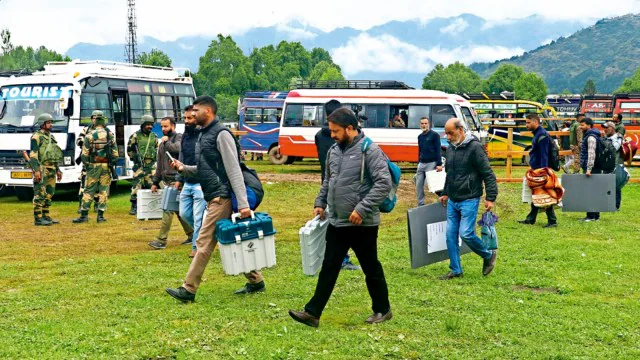Kashmiri Pandits, constituting just three percent of the total 17.4 lakh voters in the Srinagar Lok Sabha constituency, made a significant impact in the recent elections. About 38.73 percent of the 16,338 “mapped” Kashmiri Pandit migrant voters exercised their right to vote at special polling stations in Jammu on Monday. Their aim was to affirm their existence and express a desire for positive change in the Kashmir Valley, particularly for its youth.
Officials noted that this voter turnout was three times higher than in the 2019 polls, where only around 2,500 migrant voters from Srinagar LS constituency had cast their votes.
A total of 52,100 migrant voters residing across the country are eligible to vote in the Srinagar Lok Sabha constituency. However, authorities were able to map and facilitate voting for only 16,338 of them, as per an election official.
Harshita Dhar, a first-time voter who traveled from Delhi, emphasized the symbolic significance of their votes, stating, “Our vote may not directly impact our lives, but it represents our presence and support for the evolving Kashmir of today.” She expressed a desire for a better Kashmir, recalling her parents’ early life in the Valley before they moved to Jammu due to militant violence in 1990.
Reflecting on the historical context, Harshita added, “Unlike the 1990s when acceptance of our historical existence was scarce, today we are treated with respect.”
Another voter, a 35-year-old government employee who preferred anonymity, highlighted the personal importance of voting, aiming to maintain his status as an Indian citizen in official records. He expressed hope that his vote would eventually make a difference by drawing attention to their community’s concerns.
Sanjay Bali, 40, questioned the limited options available to them, emphasizing the fundamental right of every Indian to vote. He mentioned government welfare schemes for other communities and expressed a sense of duty to vote despite the challenges faced by Kashmiri Pandits.
Ritua Raina, whose husband migrated in 1989, emphasized their belief in democracy as a motivation for voting.
However, some voters faced challenges at the polling stations. At Jagti township near Nagrota, where special polling stations were set up, a group of migrants protested after discovering their names were missing from the voter lists.
The Election Commission, in an effort to increase migrant voter turnout, simplified the process by eliminating the need for “Form M” and setting up constituency-specific polling stations where migrants currently reside. Despite obstacles, many Kashmiri Pandit migrants actively participated in the electoral process, advocating for their presence and concerns in the democratic framework.

















